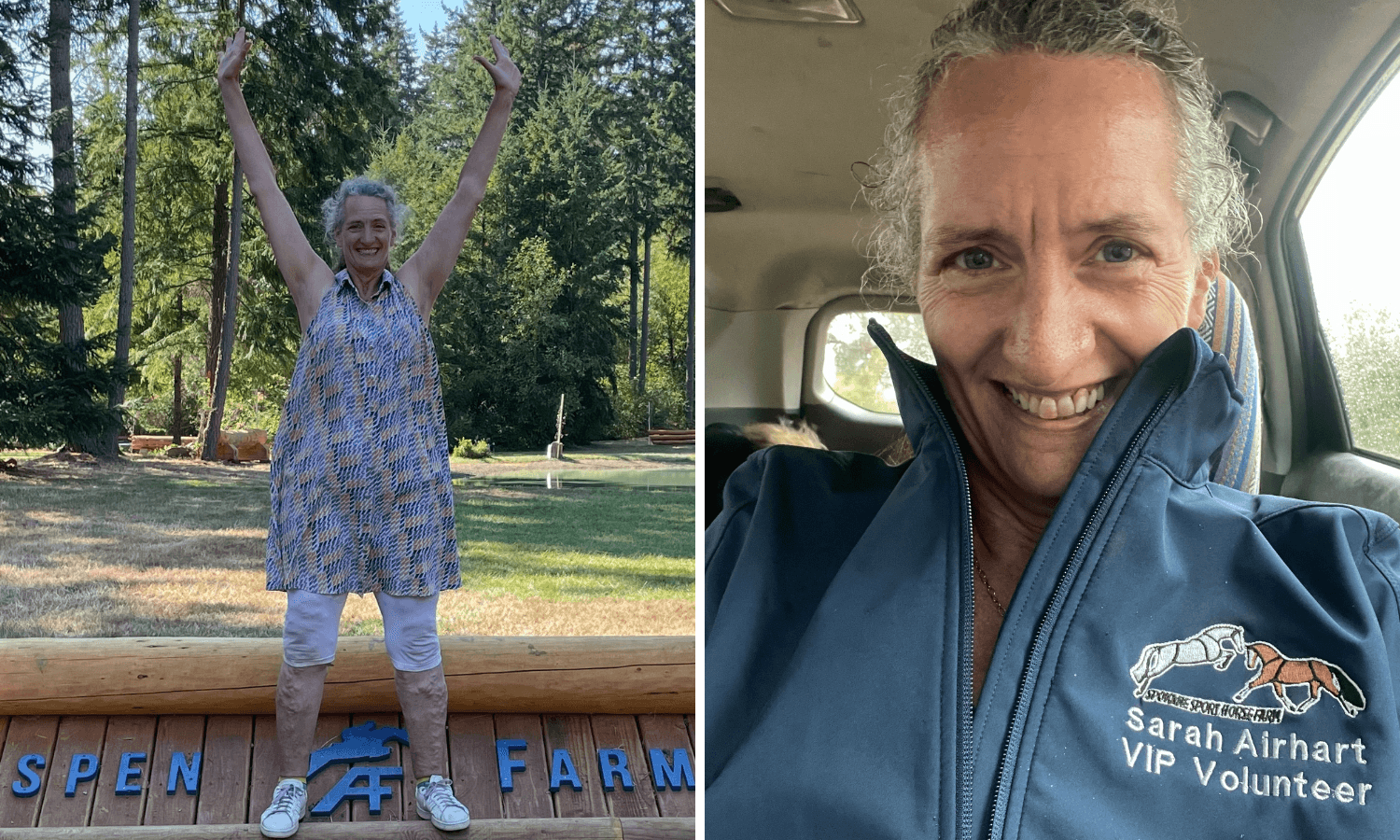The VIP Volunteer: Sarah Airhart

Growing up just a few miles from the Land Rover Burghley Horse Trials in Stamford, England, Sarah Airhart naturally gravitated toward eventing.
A member of the Burghley Pony Club, Airhart recalls riding across the Burghley Park Golf Club where her father worked, and walking through the public grounds with her mother, climbing on cross-country fences, and imagining what it would be like to jump them.
She competed in the sport until she came to the Unites States at 18 to work at a summer camp in San Francisco leading trail rides. From there, she met her husband, Jason Airhart, and started a family and a career in early childhood development, leaving horses behind for 40 years.
When one of her daughters, Harriette Airhart, showed interest in horses at age 10, Sarah started spending more time at the barn and reignited her passion for eventing.
“As soon as I stepped back in the barn, I was hooked again and started volunteering right away and started working at a local barn—whatever I could to just be around horses,” she said. “[My daughter] stopped riding and grew up and moved away, and I realized it was my time, so I started riding again about a year and a half ago.”
Sarah’s been volunteering at Area VII events near her home in Seattle, Washington, for about eight years, but she took a two-year break after suffering a nervous breakdown brought on by family and work issues. She’s since come back to volunteering and works a less stressful job as a receptionist for Seattle-based Charlie’s Produce.

“I think it’s important talking about mental health," she said. "You don’t know where people have been and where they’re coming from, which is another reason you should just always treat people respectfully and kindly.
“Getting back into volunteering just absolutely saved me,” she continued. “It became my purpose in life, so I was super excited to be able to have something I was so passionate about still and rekindle that love for volunteering and just being at horse shows in general—especially three-day events. Eventing is it for me. Even though I don’t do it myself, I just love it so passionately, and I’m so happy to be doing it.”
Sarah was named the 2022 USEA Area VII Volunteer of the Year, with 225 hours under her belt. She said it was a lifetime goal and a huge achievement. A highlight of the year was going to Rebecca Farm (Kalispell, Montana) for the first time in July where she served as a cross-country jump judge and show jumping warmup steward.
“I’m so over the moon about [the win,] although there’s other people who do so much more than me, but they just don’t count their hours properly!” she said with a laugh, adding that Area VII’s second-place volunteer, Jim Moyer, was her friendly competition in 2022. “I’m happy to be there. I find myself quite competitive with it. I didn’t think I’d be so competitive! Mostly I want more [hours] than Jim Moyer. As long as I get more than him, I’m happy!”

At her local events, like her favorite, Aspen Farm (Yelm, Washington) and Spokane Sport Horse Horse Trials (Spokane, Washington), Sarah likes to jump judge and work in dressage and show jumping warmup.
“I really like to do the dressage warmup because those are really stressful times for people, so I try to make it as relaxing and friendly and enjoyable and supportive as I possibly can,” she said. “The dressage warmup ring can be a pretty brutal place to be, and show jumping as well!”
While warmups can be overwhelming to horses and riders, Sarah tries to be a center of calm.
“These riders and trainers have a lot on their plate, and there’s a lot riding on it for them, literally, so I try to be a source of calm and kindness and enjoyment so that they can not have to worry and know that I’m there to protect them and help them and make everything run smoothly,” she said. “To do that, you have to have some ground rules, and for the most part, people really appreciate it. Instilling the rules is the hardest thing, but it’s also the thing that makes it work the best.
“Jump judging on cross-country day, I just find it fascinating to be able to watch horses and rider come to the same question in such completely different ways and how they choose to approach the fence and how they go over it and move on—it’s just fascinating to me that there’s so many ways that can happen at the same jump. It’s brilliant to watch,” she added.

Sarah, 54, is currently taking lessons to improve her riding and hopes to make it to the Intro level someday. For now, she’s looking forward to the spring season where she can enjoy the company of eventers again. Since many of the events she volunteers at are several hours away, she packs up her car and camps, treating the weekend like a vacation.
“I think the camaraderie of it, that we’re all in it together, and we’re all there for the same reasons—because we love the sport, and we love our sport. It’s just an invaluable time for me to just ‘fill up my tank’ on the excitement and anticipation and the nerves and the energy,” she said. “It was so nice to be welcomed back into the horse community. It was such a safe place, and I felt so honored that that was still there for me and was still an option and that people welcomed me with open arms. It was a saving grace, and it truly is my purpose.”
About the USEA Volunteer Incentive Program
Volunteers are the lifeblood of our sport, the unsung heroes, and the people who make it possible to keep the sport alive. In efforts to recognize the dedication, commitment, and hard work that volunteers put into eventing, USEA formed the Volunteer Incentive Program (VIP) in 2015. In 2017, an online management portal was designed for volunteers, organizers, and volunteer coordinators at EventingVolunteers.com (available as an app for iOS and Android).
Volunteer incentives include national and area recognition, year-end awards with ribbons, cash prizes, and trophies, a top ten USEA Volunteer leaderboard, and a Volunteer of the Year award which is given to the volunteer who tops the leaderboard by accumulating the most volunteer hours over the USEA competition year. Click here (https://useventing.com/support-usea/volunteer) to learn more about the USEA Volunteer Incentive Program.















